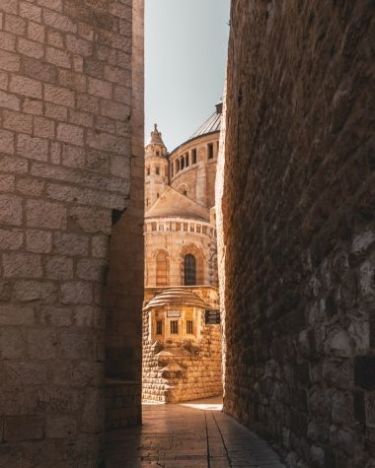
The Archbishop of Canterbury has defended comments about the plight of Christians in the Holy Land.
Jerusalem church leaders warned in the lead-up to Christmas of "countless" attacks on Christians and Christian sites in the region.
"These tactics are being used by such radical groups in a systematic attempt to drive the Christian community out of Jerusalem and other parts of the Holy Land," they said.
Archbishop Justin Welby echoed these concerns in a Sunday Times article co-authored with the Anglican Archbishop in Jerusalem.
Together they wrote, "Christians in Israel enjoy democratic and religious freedoms that are a beacon in the region.
"But the escalation of physical and verbal abuse of Christian clergy, and vandalism of holy sites by fringe, radical groups, are a concerted attempt to intimidate and drive them away."
They also expressed regret about the decline in the number of Christians in the Holy Land, which they attributed in part to "the growth of settler communities, and travel restrictions brought about by the Separation Wall".
The Jewish community has been angered by the claims, with the President of the Board of Deputies of British Jews, Marie van der Zyl, writing to the Archbishop of Canterbury to ask for a meeting.
She said the claims were "deeply troubling".
"I note that in the past century, both in Israel's heartlands and the West Bank, the demographics show that the Palestinian population has increased significantly," she said.
"If the overall Palestinian population has greatly increased, but the Palestinian Christian population has significantly declined, then clearly there are more complex reasons than those raised in the article, which appeared to attribute this decline to Jewish settlers and the barrier built to halt the wave of terror attacks of the Second Intifada."
Writing in The Spectator, Jake Wallis Simons, editor of the Jewish Chronicle, suggested Welby was wrong to single out Israel when Christians are suffering worse persecution in other countries.
"It goes without saying that no 'fringe radical group' in Israel has ever carried out anything like the Easter Bombings in Sri Lanka," he wrote.
He continued, "These attacks must of course be condemned. But this does not detract from the fact that overall, Christians in Israel are flourishing."
He added, "Compare this to the routine anti-Christian carnage across the region, which the Foreign Office has described as 'coming close to genocide' ... Yes, attacks by Jewish hardliners are appalling, as is all sectarian violence. But by far the greater Christian persecution lies elsewhere in the Middle East."
Israel itself has responded by calling the claims "baseless" and releasing the results of a poll according to which 84% of Christians said they were satisfied with life in the country.
"The statement by Church leaders in Jerusalem is particularly infuriating given their silence on the plight of many Christian communities in the Middle East suffering from discrimination and persecution," Israel's Foreign Ministry said.
"Religious leaders have a critical role to play in education for tolerance and coexistence, and Church leaders should be expected to understand their responsibility and the consequences of what they have published, which could lead to violence and bring harm to innocent people."
Responding in The Spectator, Welby said the "deadly persecution" of Christians around the world was something that the Church of England "takes profoundly seriously", but stood by his comments about Christianity in the Holy Land.
"The Anglican Archbishop in Jerusalem, with whom I co-wrote an article in this week's Sunday Times, has every right to speak about the threat facing his community," he wrote.
"As we stated in the article, 'Christians in Israel enjoy democratic and religious freedoms that are a beacon in the region' and therefore evidently do not experience in Israel the persecution described above.
"But this does not change the facts about the plight of Christians in the land where Christianity began."
He said the "facts are stark and undeniable", with Palestinian Christians declining "to such an extent that their sustainable future in these places is now in question".
"This has been exacerbated by the recent, concerted and vicious attacks by radical groups on church buildings and holy sites, and on clergy and other Christians in Jerusalem going about their business and seeking to worship peacefully," he said.
"That is why the patriarchs and heads of churches in Jerusalem recently raised an unprecedented and urgent alarm about the future of Christians in the Holy Land. It is worth reading and reflecting on.
"It's an honour to stand alongside Archbishop Hosam, as well as other Christian leaders in the Holy Land including the Greek Orthodox Patriarch of Jerusalem, His Beatitude Theophilos III. They are internationally respected champions of peace, committed to building bridges between faiths and communities.
"Despite the pressures they live under, they seek the flourishing of all people in the Holy Land and wider region; a vision I share deeply and pray for continually."




